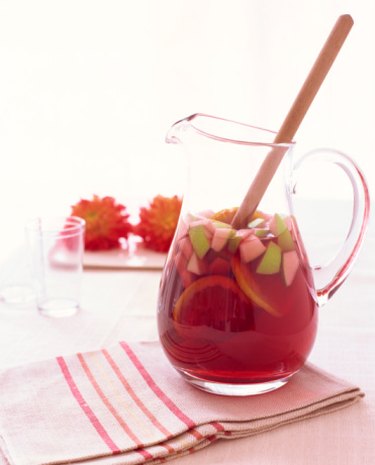
Wooden spoons are advantageous kitchen utensils because they will not scratch nonstick cookware, and wood as a material is durable and lightweight. Even though wood has natural antimicrobial properties, this does not mean that wooden kitchen utensils cannot harbor bacteria. This may tempt you to send your spoons through the dishwasher to ensure they are clean and disinfected, but you should not.
Proper Care
Video of the Day
Wooden spoons should be hand-washed in a combination of soap and hot water. Do not leave your spoons to soak in standing dishwater. Sanitize your spoons as needed using a solution of 1 tsp. bleach to 1 qt. of water or a solution of 5 parts water to 1 part vinegar. Towel-dry your spoons, then allow them to air dry. You may lightly coat unfinished spoons in oil to help preserve the wood and prevent cracking. You may use mineral oil or cooking oil.
Video of the Day
Cracking
You should not put wooden spoons in the dishwasher because such treatment can lead to cracking of the wood. Cracking can occur when the wood swells with absorbed water, then shrinks with the loss of that water. Cracking is also a danger when you hand-wash your spoons, which is one of the main reasons professional woodworkers recommend against soaking wooden spoons.
Odors
Within the dishwasher, wooden spoons are exposed to hot water for an extended period of time. This treatment leads to effects which are much like those of soaking; washing spoons in the dishwasher can lead to warping, furring of the wood and cracking. Odors from dirty water within the dishwasher can penetrate the wood of your utensils and leave behind an unpleasant smell. That smell may emerge when you immerse your spoons in food during cooking.
Raised Grain
Washing wooden spoons in the dishwasher can lead to raised grain in the wood. When wood is washed for the first few times with any method, it may lead to raising of the grain, but this process usually stops after several washings. You can treat minor grain issues by buffing the surface smooth with sandpaper. According to the Crafty Owl Primitives website, well-seasoned spoons will not develop raised grain; however, conditions within the dishwasher -- including heat, harsh detergents and longer-term exposure to water -- can remove the buildup of protective oil coatings and cause problems to develop.
Peeling
Washing a wooden spoon that has a thin coat of finish over the wood in the dishwasher may cause the finish to separate from the wood. This could allow pieces of the finish to slough off into your food during cooking. The lacquer or paint used to finish the spoon may not be safe to consume.
- Arizona Cooperative Extension; Cutting Boards (Plastic vs. Wood); Scottie Misner, Ph.D., R.D., et al.; October 2008
- North Carolina State University Cooperative Extension; Washing and Sanitizing Kitchen Items; Dr. Angela Fraser; August 2000
- Crafty Owl; How to Care for Your Wooden Kitchen Utensils; Dierdre Crowl, et al.
- EcoChoices EcoKitchen: Rosewood Utensils
- The Cooking Inn: Caring for Wooden Utensils and Cutting Boards
- Utah State University Cooperative Extension; FAQ: Can I Use a Wood Cutting Board?; Pauline Williams; Sept. 12, 2006
- Handcrafted Wooden Spoons: Some Questions People Have Asked
- What’s Cooking America: Finishes for Butcher Block, Countertops & Wooden Utensils